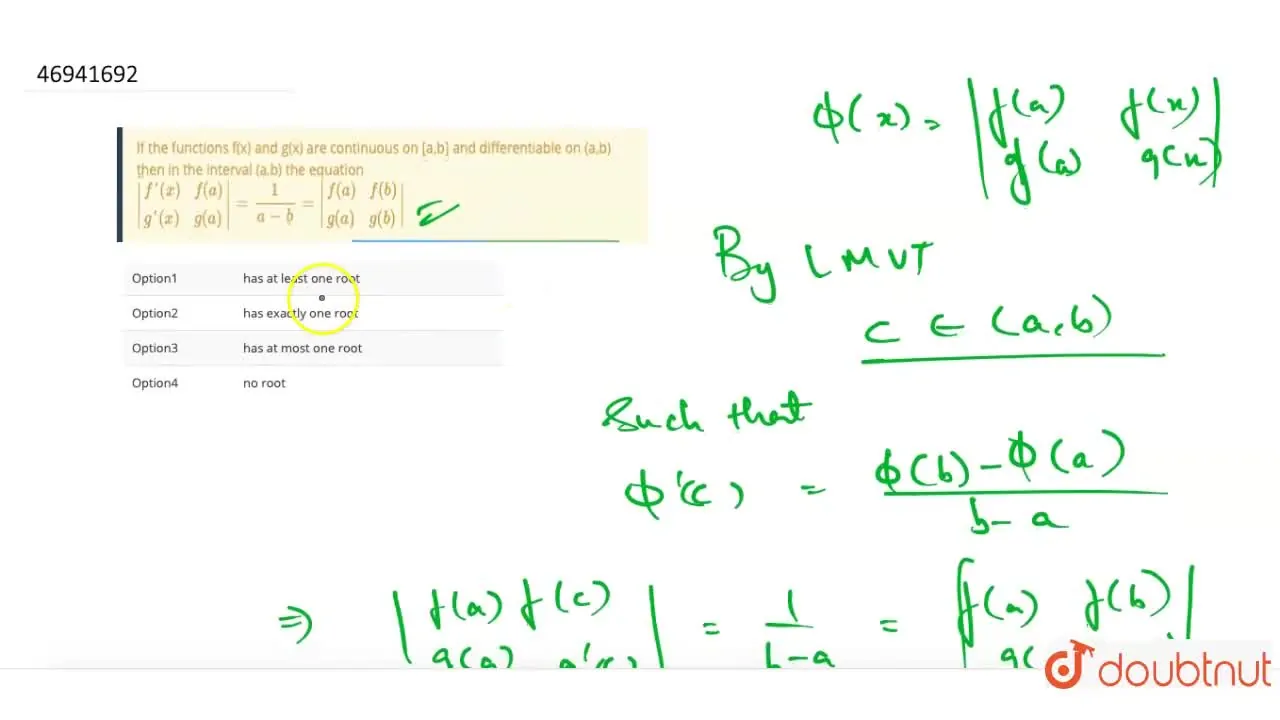If the functions f(x) and g(x) are continuous on [a,b] and differentiable on (a,b) then in the interval (a,b) the equation
∣∣∣f'(x)f(a)g'(x)g(a)∣∣∣=1a−b=∣∣∣f(a)f(b)g(a)g(b)∣∣∣
has at least one root
has exactly one root
has at most one root
no root
The correct Answer is:A
Consider the function ϕ(x) given by
ϕ(x)∣∣∣f(a)f(x)g(a)g(x)∣∣∣
Since f(x), and g(x) are continuous on [a,b] and differentiable on (a,b) Therefore,ϕ(x) is continuous on [a,b] and differentiable (a,b) . Consequecly, by Largrange's mean value theorem therer exists at leat on c∈(a,b) such that
ϕ'(c)=ϕ(b)−ϕ(a)b−a
⇒∣∣∣f(a)f(c)g(a)g'(c)∣∣∣=1b−a=∣∣∣f(a)f(b)g(a)g(b)∣∣∣
⇒∣∣∣f'(c)f(a)g'(c)g(a)∣∣∣=1b−a=∣∣∣f(a)f(b)g(a)g(b)∣∣∣
Hence, the equation
∣∣∣f'(c)f(a)g'(x)g(a)∣∣∣=1b−a=∣f(a)f(b)g(a)g(b)
has at least root in (a,b)
Related Playlists
- BOOK - OBJECTIVE RD SHARMACHAPTER - MEAN VALUE THEOREMSEXERCISE - Section II - Assertion Reason Type4videos
MEAN VALUE THEOREMS
- BOOK - OBJECTIVE RD SHARMACHAPTER - MEAN VALUE THEOREMSEXERCISE - Exercise28videos
MEAN VALUE THEOREMS
- BOOK - OBJECTIVE RD SHARMACHAPTER - MEAN VALUE THEOREMSEXERCISE - Exercise28videos
MEAN VALUE THEOREMS
- BOOK - OBJECTIVE RD SHARMACHAPTER - MATRICESEXERCISE - Chapter Test30videos
MATRICES
- BOOK - OBJECTIVE RD SHARMACHAPTER - PAIR OF STRAIGHT LINESEXERCISE - Chapter Test19videos
PAIR OF STRAIGHT LINES
Similar Questions
If the function f(x)andg(x) are continuous in [a, b] and differentiable in (a, b), then the f(a) f (b) equation ∣∣∣f(a)f(b)g(a)g(b)∣∣∣=(b−a)∣∣∣f(a)f'(x)g(a)g'(x)∣∣∣ has, in the interval [a,b] :
View SolutionIf f(x)andg(x) are continuous and differentiable functions, then prove that there exists c∈[a,b] such that f'(c)f(a)−f(c)+g'(c)g(b)−g(c)=1.
View SolutionIf f(x)andg(x) are continuous functions in [a,b] and are differentiable in(a,b) then prove that there exists at least one c∈(a,b) for which. |f(a)f(b)g(a)g(b)|=(b−a)∣∣f(a)f′(c)g(a)g′(c)∣∣,wherea<c<b.
View SolutionLet fandg be function continuous in [a,b]and differentiable on [a,b].If f(a)=f(b)=0 then show that there is a point c∈(a,b) such that g'(c)f(c)+f'(c)=0.
View Solutionif f(x) and g(x) are continuous functions, fog is identity function, g'(b)=5 and g(b)=a then f'(a) is
View SolutionPARAGRAPH : If function f,g are continuous in a closed interval [a,b] and differentiable in the open interval (a,b) then there exists a number c in (a,b) such that [g(b)-g(a)]f'(c)=[f(b)-f(a)]g'(c) If f(x)=ex and g(x)=e−x,a≤x≤b c=
View SolutionIf f and g are both continuous at x = a, then f-g is
View SolutionIf f(x)andg(x) are two continuous functions defined on [−a,a], then the value of ∫a−a{f(x)+f(−x)}{g(x)−g(−x)}dx is
View SolutionIf f(x) and g(x) are continuous functions satisfying f(x)=f(a-x) and g(x)+g(a-x)=2 then what is ∫a0f(x)g(x)dx equal to
View SolutionStatement 1: If both functions f(t)andg(t) are continuous on the closed interval [1,b], differentiable on the open interval (a,b) and g′(t) is not zero on that open interval, then there exists some c in (a,b) such that f′(c)g′(c)=f(b)−f(a)g(b)−g(a) Statement 2: If f(t)andg(t) are continuou and differentiable in [a, b], then there exists some c in (a,b) such that f′(c)=f(b)−f(a)b−aandg′(c)g(b)−g(a)b−a from Lagranes mean value theorem.
View Solution


